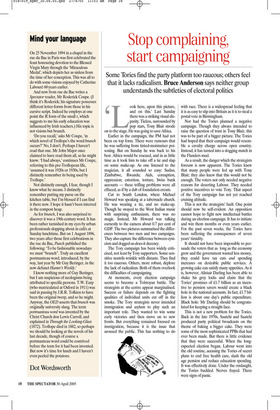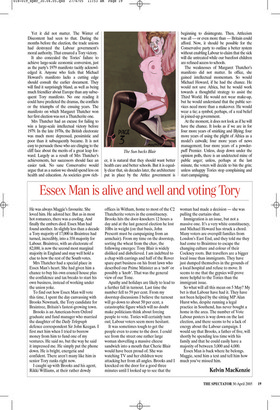Stop complaining, start campaigning
Some Tories find the party platform too raucous; others feel that it lacks radicalism. Bruce Anderson says neither group understands the subtleties of electoral politics ‘Look here, upon this picture, and on this.’ Last Sunday there was a striking visual disparity. Tieless, surrounded by pop stars, Tony Blair strode on to the stage. He was going to save Africa.
Earlier in the campaign, the PM had not been on top form. There were rumours that he was suffering from tinted-moisturiser poisoning. But on Sunday he was back to his best. Africa would be rescued, and in as little time as it took him to take off a tie and slap on some make-up. As one listened to the magician, it all sounded so easy: Sudan, Zimbabwe, Rwanda; Aids, corruption, oppression; extortion, torture, Swiss bank accounts — these trifling problems were all effaced, as if by a dab of foundation cream.
Cut to South London, where Michael Howard was speaking at a tabernacle church. He was wearing a tie, and no make-up. Though he swayed to the West Indian music with surprising enthusiasm, there was no magic. Instead, Mr Howard was talking earnestly to the camera about 0.7 per cent of GDP. The two pictures summarised the differences between two men and two campaigns. They also capture the difference between cynicism and dogged-as-does-it decency.
The Tory campaign has been widely criticised, not least by Tory supporters. Some sensitive nostrils wrinkle with distaste. They find it too raucous. Others, more robust, deplore the lack of radicalism. Both of them overlook the difficulties of campaigning.
At moments, every election campaign seems to become a Tolstoyan battle. The strategists at the centre appear marginalised. Success or failure depends on the fighting qualities of individual units cut off in the smoke. The Tory strategists never intended immigration and asylum to play such an important role. They wanted to win some early victories and then move on to new fronts. But everything remained focused on immigration, because it is the issue that aroused the public. This has nothing to do with race. There is a widespread feeling that it is as easy to slip into Britain as it is to steal a postal vote in Birmingham.
Nor had the Tories planned a negative campaign. Though they always intended to raise the question of trust in Tony Blair, this was to be part of a bigger picture. The Tories had hoped that their campaign would resemble a cavalry charge across open country. Instead, it has turned into a slogging match in the Flanders mud.
As a result, the danger which the strategists foresaw is now apparent. The Tories knew that many people were fed up with Tony Blair; they also knew that this would not be enough. The voters not only needed negative reasons for deserting Labour. They needed positive incentives to vote Tory. That aspect of the Tory campaign has not yet reached cruising altitude.
This is not the strategists’ fault. One point should now be self-evident. An opposition cannot hope to fight new intellectual battles during an election campaign. It has to initiate and win them months or even years earlier. For the past seven weeks, the Tories have been suffering the consequences of seven years’ timidity.
It should not have been impossible to persuade the voters that as long as the economy grew and the government wasted less money, they could have tax cuts and spending increases on desirable public services. A growing cake can satisfy many appetites. As it is, however, Alistair Darling has been able to shake his grey locks and claim that the Tories’ promises of £1.7 billion as an incentive to pension savers would create a black hole in the national accounts. In fact, £1.7 billion is about one day’s public expenditure. Black hole: Mr Darling should be congratulated for keeping a straight face.
This is not a new problem for the Tories. Back in the late 1970s, Saatchi and Saatchi produced party political broadcasts on the theme of baking a bigger cake. They were some of the most sophisticated PPBs that had ever been made. But there is little evidence that they were successful. When the longexpected election began, Labour went into the old routine, accusing the Tories of secret plans to end free health care, slash the old age pension and reduce education spending. It was effectively done. Under the onslaught, the Tories buckled. Nerves frayed. There were signs of panic. Yet it did not matter. The Winter of Discontent had seen to that. During the months before the election, the trade unions had destroyed the Labour government’s moral authority. That ensured a Tory victory.
It also concealed the Tories’ failure to achieve large-scale economic conversion, just as the party’s 1979 manifesto tacitly acknowledged it. Anyone who feels that Michael Howard’s manifesto lacks a cutting edge should consult the earlier document. They will find it surprisingly bland, as well as being much friendlier about Europe than any subsequent Tory manifesto. No one reading it could have predicted the dramas, the conflicts or the triumphs of the ensuing years. The manifesto on which Margaret Thatcher won her first election was not a Thatcherite one.
Mrs Thatcher had an excuse for failing to win a large-scale intellectual victory before 1979. In the late 1970s, the British electorate was much more depressed, pessimistic and poor than it subsequently became. It is not easy to persuade those who are clinging to the cliff face about the merits of a great leap forward. Largely as a result of Mrs Thatcher’s achievements, her successors should face an easier task. No sane Conservative would argue that as a nation we should spend less on health and education. As societies grow rich er, it is natural that they should want better health care and better schools. But it is equally clear that, six decades later, the architecture put in place by the Attlee government is beginning to disintegrate. Then, Attleeism was all — or even more than — Britain could afford. Now, it should be possible for the Conservative party to outline a better system without enabling Labour to claim that the sick will die untreated while our barefoot children are refused access to schools.
The weaknesses of Margaret Thatcher’s manifesto did not matter. In office, she gained intellectual momentum. So would Michael Howard, if he had the chance. He would not save Africa, but he would work towards a thoughtful strategy to assist the Third World. He would not wear make-up, but he would understand that the public services need more than a makeover. He would wear a tie; a symbol, perhaps, of a real belief in joined-up government.
At the moment, it does not look as if he will have the chance. It looks as if we are in for four more years of smirking and Blying; four more years of using the plight of Africa as a model’s catwalk; four more years of news management; four more years of a powderpuff Premier. Unless, deep down under the opinion polls, there is an undetected mine of public anger; unless, perhaps at the last minute, the voters will decide to bin the grin; unless unhappy Tories stop complaining and start campaigning.





















































 Previous page
Previous page